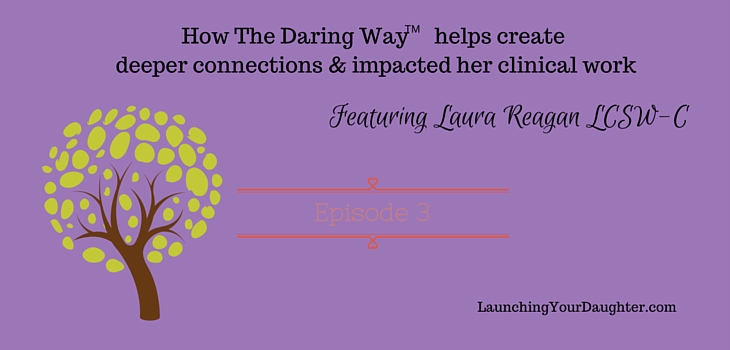Todays guest is Laura Reagan LCSW-C. She is a Certified Daring WayTM facilitator, in private practice located in Severna Park, Maryland and has a podcast called Therapy Chat. She specializes in working with adults who have experienced some childhood relational trauma, such as emotional or physical neglect, physical, sexual or emotional abuse, or have witnessed domestic violence. On todays episode we are discussing how her certification as a certified Daring WayTM facilitator not only assists in creating deeper connections in her groups, but how it helped her be a better clinician and can be used in individual therapy.
“The Daring WayTM certification program is based on a shame resiliency model created by Brene Brown. It is about identifying how shame shows up in your life, building resiliency to it and how to show up authentically in your relationships. We all have shame in our lives. If we do not have the awareness of our shame, then showing up authentically in our relationships will be challenging and we can feel disconnected from others.
Parenting can be very vulnerable because we want to show up as if we have all the answers. If you can allow yourself to be vulnerable and to be imperfect, it is a great role model to your children. Laura discussed in her own community how external pressures have increased on adolescents regarding academic achievements, being in sports, being the best in the sport and having high achievements. Being able to role model that you are not perfect, don’t need to be perfect and it is ok to do your best, but not be perfect, creates deeper connections with your children and your partner.
Today teens are trying to look good for pictures and will repeatedly take a photo until they get it right. The expectation is that you better look good, your teeth need to be white, you need to shave off that weight, and you see same smile on every picture vs seeing the true emotion of the person. It is normal to feel awkward or unsure of yourself at this age. Our society has an expectation that girls need to look like models or look a certain way. The message is you matter if a you look a certain way. It is not a conscious process with the girls. This is harmful if your belief is how you look on the outside defines your worth. As an adult woman if you heard messages from your mom about her being concerned about her looks or her weight, it can get internalized and becomes your adult inner critic. You have to live your life as yourself vs expectations of the world or your family.
The Daring WayTM is a psychoeducation model. This model was designed to be done with groups because it is about creating deeper connections. Group work can be powerful because you can relate to others, feel seen and heard and supported. If a person has unresolved trauma they may need individual work first, then as they feel more confident, do the group work.”
Laura currently does adult group work with this model. The biggest barrier is adults hear her work, but hope that therapy will be fast. When you haven’t been someone who has given yourself permission to go inward and have been falling into perfectionist behavior or people pleasing, giving yourself that much attention and focus might be foreign to you. The person may show up thinking it is a quick fix, but Laura does deeper inner work so the person can be transformed and do group work.
Some of the benefits of this type of work is giving yourself permission for self-care, doing inner work and role modeling to children that it is ok to invest in yourself and for you to show up authentically in your relationships. You can have deep meaningful connections when you do this inner work. When there is a change in the system the whole system changes. This model works well for both women and men. You can gain a deeper connection to self, discover your inner wants/needs and can communicate that with your partner and children. It can also help children feel seen and heard and that they are enough.
Laura uses this parts of this model in working with teens. She takes it from good/bad, failure/success, to you were brave and showed up in front of people, and the outcome doesn’t matter. Our constructs are made up. Life is are you learning, are you growing, and living a life that is fulfilling and meaningful vs. achievement.
The certification process helped her identify barriers she used to have as clinician and after training it allowed her to be herself, be authentic and vulnerable, not where her clients are taking care of her, but her being more transparent with them.
Laura recommends mindfulness-getting grounded and being in present moment and self-compassion practice. What I learned in Daring WayTM training, you are separate from others when you are judging them thus you’re judging yourself. When you judge yourself it gets in the way of self compassion. When you have more self acceptance of yourself, you will have more compassion and acceptance of others. Self compassion is key to connectedness.
Laura’s information
Therapy Chat podcast (on iTunes, Stitcher and Googleplay)
For more information on Brene Brown’s book please visit my resource page.

